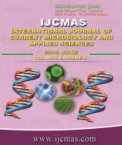


 National Academy of Agricultural Sciences (NAAS)
National Academy of Agricultural Sciences (NAAS)

|
PRINT ISSN : 2319-7692
Online ISSN : 2319-7706 Issues : 12 per year Publisher : Excellent Publishers Email : editorijcmas@gmail.com / submit@ijcmas.com Editor-in-chief: Dr.M.Prakash Index Copernicus ICV 2018: 95.39 NAAS RATING 2020: 5.38 |
Alternaria leaf blight of tomato caused by Alternaria solani is a soil inhabiting and air-borne pathogen responsible for considerable loss in tomato production. In the absence of resistant cultivars, the use of fungicides and biocontrol agents to control the disease is one exercise training. When there is an epidemic outbreak for some reason, perhaps the use of fungicides are one of the best options available. These fungicides must be used judiciously according to the need, type of body involved and availability of new fungicides. It requires the evaluation of fungicides under in vivo and in vitro conditions to know its effectiveness, start the spray schedule in field conditions and for developing a cost effective disease management approach. The present investigation based of five fungicides and two bioagents against Alternaria solani under in vivo and in vitro conditions. These fungicides show significant effect inhibitions to the pathogen in vitro and in vivo conditions. The Tebuconazole 25.9 % EC @ 0.1% was most effective followed by propiconazole 25%EC @ 0.1% and copper oxychloride 50 % WP @ 0.30% less in found fairly economical for the management of early blight disease along with significantly highest fruit yield. The biocontrol agents, foliar spraying of fungal bioagents i.e. Trichoderma viride @ 0.25% was proved highly effective followed by bacterial bioagent i.e. Pseudomonas fluorescens @ 0.25%.
 |
 |
 |
 |
 |